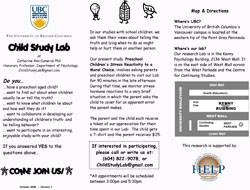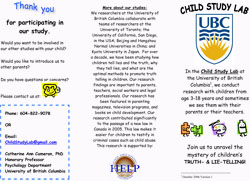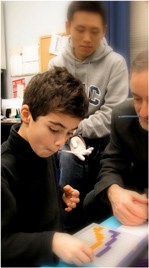Dr Joanne Weinberg, Anatomy, UBC; Dr Kang Lee, Institute of Child Study, University of Toronto; Dr Elizabeth J. Susman, Biobehavioral Health, the Pennsylvania State University, Dr Kathryn Wynn-Edwards, University of Calgary.
For over a decade now, our labs have investigated the development of children’s understanding of verbal deception. We have established systematic cross-cultural differences, in situations where such values as modesty, loyalty, kindness and the community good collide with the importance of being honest: Canadian children more readily condone lying to protect oneself or a best friend than do Chinese children; by contrast, Chinese children find protecting a class or team more acceptable than do Canadian children. Applying a bio-psycho-social model, we have also, investigated the effects of an anxiety-provoking psychosocial stressor on one particular physiological marker of stress reactivity (cortisol) in relation to several individual difference factors. We have established associations between cortisol, heart rate reactivity, emotional reactivity, and concurrent attachment relationships.
This study engages a new interdisciplinary research network, and involve collaboration between our cross-cultural moral development and our stress reactivity teams. We will examine associations between our basic variables of interest with Euro-Canadian and Asian families. We will involve parents and their preschool-aged children in a procedure that requests parents to encourage their child, ostensibly to protect their reputations, to deny that the parent has committed a small misdemeanor. Parents bring their child into our Lab for approximately 90 minutes. We will track the stress reactivity of both parent and child over that period of time. Both child and parent are expected to experience stress as a result of the protocol and children that choose to lie to protect their parent will experience more stress that those who choose to tell the truth. We expect associations as we have previously found between attachment relations, emotional reactivity and behaviours, and physiological responses to the stressor. Further, we expect associations between parent and child reactivity patterns.

Recruitment Brochure [PDF]

Debriefing Brochure [PDF]
|

Young participant and parent contribute saliva samples in a study of hormonal stress responses to a moral choice
|





